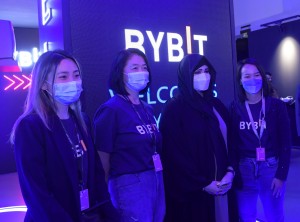DUBAI, United Arab Emirates – Media OutReach – 13 March 2022 – Bybit, the world’s fastest growing cryptocurrency exchange, is pleased to support the digital art chapter of Art Dubai 2022 at Madinat Jumeirah, Dubai. After a three-year break, the global platform for artistic expressions from the Middle East and Global South goes beyond the realms of physical art to empower creatives in the digital dimension in its 15th edition, its most ambitious and extensive to date.
Bybit is delighted to welcome Her Highness Sheikha Latifa bint Mohammed bin Rashid Al Maktoum into the Bybit universe for our inaugural participation as Lead Partner of Art Dubai 2022 on March 9, 2022
Bybit is the Lead Partner of Art Dubai Digital, a new section of the iconic art fair to bridge between the rapidly-developing crypto-sphere and the international art market.
Bybit and Art Dubai meet at the intersection of digital art forms and human creativity amidst the paradigm shift of our times. Artists and creatives are no strangers to digital innovations and the blurring of boundaries between visions and realities, with roots in digital artistry going back to the 1980s. The global pandemic has accelerated the building of new worlds and the coming together of new artistic communities in the digital space.
The new Art Dubai Digital section brings to life art forms transcending conventional constraints. Showcasing 17 presentations from both traditional galleries and digitally native ones, the digital section gives a voice to emerging artists and market participants, many of whom are first-timers at an international art fair.
Art lovers looking to experience the art or support an artist can join the fair through the Bybit NFT Marketplace, now offering 15 artworks from the participating galleries of Art Dubai.
Art Dubai 2022 also presents Bybit Talks, a new addition to facilitate dialogues between the crypto space and the art world to make crypto, web3 digital practices and NFTs concepts and opportunities more accessible to the public.
Bybit’s presence at Art Dubai 2022 includes a limited run of NFTs at the booth featuring artists and art collectives MIRL (Made in Real Life), Song Ting, Viia Yeon, Maruchef, Hyuck, S.R Innovation Lab, Oscar Oiwa, Yeo Huang Joo, Saule Dyussenbina, Ziyang Wu, Yasuo Nomura, Kevin Heisner and SIM_Moby.
The timely drive for digital art highlights the zeitgeist of a post-pandemic world of mixed realities. The Bybit NFT Marketplace provides an integrated one-stop destination for artists, creators and collectors, to create, and sell or trade on the Ethereum ERC-721 standard through their spot accounts — providing the tools of digital ownership to collectors of all knowledge and skill levels.
“Art Dubai’s admirable work in elevating talent to the global stage, particularly with artists from underrepresented regions, echoes Bybit’s endeavor to democratize next level trading for the broader public. NFTs are one of the new tools to reinvent and rewire the art market, and a new generation of artists and art patrons are drawn to a new parallel world that rewards authenticity and the imaginative minds,” said Igneus Terrenus, Head of Communications at Bybit.
“There are two important legs in the projects. We have galleries from the physical world and galleries that only exist in the metaverse. And to complement these and help understand what they’re going to be showcasing, we have one of the most exciting educational programs today, among them is Bybit Talks by Bybit, the sponsor of the digital section, and the Global Art Forum,” said Pablo del Val, Artistic Director of Art Dubai at the opening address.
“In the last two years, the 3D world lost approximately half a dimension. At the same time, new multiple dimensions have been discovered online. We are now extensions of our devices and this changes everything. It’s the kind of paradigm shift that civilization sees every few 100 years. We’ve been going through these changes arguably for the last 30 years and now in a more and more accelerated manner, evidenced in the mainstreaming of crypto, blockchain technologies and NFTs over just the last year. In the two and a half dimension, digital artifacts and crypto economies are as real or unreal as anything else. And there’s such rapid growth in digital platforms, it’s often difficult to keep track even for seasoned insiders. So the Bybit talks will explore the unknown past and the possible futures of NFT, how our ideas and experiences of media buy change with decentralized institutions, and what kind of values beyond merely the monetary is at stake with these new technologies,” remarked Shumon Basar, Commissioner, Global Art Forum.
About Bybit
Bybit is a cryptocurrency exchange established in March 2018 to offer a professional platform where crypto traders can find an ultra-fast matching engine, excellent customer service, and multilingual community support. The company provides innovative online spot and derivatives trading services, mining and staking products, as well as API support, to retail and institutional clients around the world, and strives to be the most reliable exchange for the emerging digital asset class. Bybit is the proud partner of Formula One racing team Oracle Red Bull Racing, esports teams like NAVI, Alliance, Astralis, and Virtus.pro; German soccer club Borussia Dortmund and Japanese soccer club Avispa Fukuoka.
For more information please visit: https://www.bybit.com/
For updates, please follow Bybit’s social media platforms on
https://discord.com/invite/bybit
https://www.facebook.com/Bybit
https://www.instagram.com/bybit_official/
https://www.linkedin.com/company/bybitexchange/
https://www.reddit.com/r/Bybit/
https://t.me/BybitEnglish
https://www.tiktok.com/@bybit_official
https://twitter.com/Bybit_Official
https://www.youtube.com/c/Bybit
About Art Dubai
Founded in 2007, Art Dubai is the premier platform to see and buy modern and contemporary art from the Global South. Featuring Contemporary, Modern and Digital gallery sections, annual artist commissions and year-round collector and education programmes, Art Dubai champions art and artists from across the Global South, providing a relevant and increasingly important alternative to mainstream, largely Western-led narratives.
Art Dubai is held in partnership with A.R.M. Holding. The fair is sponsored by leading Swiss wealth management group, Julius Baer. The Dubai Culture & Arts Authority (Dubai Culture) is the fair’s strategic partner. Bybit is the lead partner of Art Dubai Digital.
Contact:

